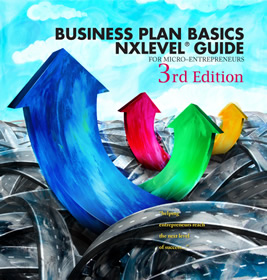 NxLeveL® for Micro Entrepreneurs
NxLeveL® for Micro Entrepreneurs
This introductory small-business course was developed by an experienced microbusiness training team, and can be taught in various configurations depending on the objectives of the training organization. The 15–session course presents options and strategies for achieving self-sufficiency through self-employment, with an emphasis on learning and meeting professional standards for financial management, marketing and customer service. Whether participants wish to explore self-employment options, turn a hobby into a reliable income source or professionalize an existing microbusiness, NxLeveL's practical "learn it today, use it tomorrow" approach will help them build a solid foundation for success.
Learning Objectives
Session One
- The importance of professionalism
- Self-assessment: communication skills, time management and other business skills
- The value of networking
- Preparing an action plan for your microbusiness
Session Two
- What kind of business is right for you?
- What is your business niche?
- Who are your customers?
- Contingency planning
Session Three
- Why planning is essential
- Setting realistic business goals and objectives
- The NxLeveL Micro-Entrepreneur Business Plan
Session Four
- Elements of a marketing plan
- The basics of market research
- Useful types of market data
- Understanding your place in your industry
Session Five
- Laws and regulations that affect microbusiness
- Getting help with regulations
- Understanding contracts and leases
Session Six
- Managing your microbusiness
- The challenges of running a home-based business
- Hiring and managing employees
- Business insurance and other expenses
Session Seven
- How to describe the features and benefits of your products
- How to find out who and where your customers are
- How to research your competitors
- How to estimate your market potential
Session Eight
- Effective microbusiness marketing strategies
- How packaging affects success
- Creating a brand identity
- Pricing and your break-even point
Session Nine
- Delivering your product or service
- How location and distribution affect price and profitability
- Promoting your microbusiness
- Developing a marketing budget
Session 10
- The basics of online promotion
- Online sales and order fulfillment
- E-commerce options for microbusiness
Session 11
- Basic selling concepts
- What customers need and expect from your business
- Developing a customer service philosophy
Session 12
- Understanding cash flow projections and budgeting
- Developing realistic sales and expense forecasts
- Preparing a cash flow projection for Year 1
- The purpose of Income Statements and Balance Sheets
- Calculating start-up costs for your microbusiness
Session 13
- Making ethical business decisions
- The importance of bookkeeping and recordkeeping
- How and when to use common business forms
- Getting professional help
Session 14
- Financing your microbusiness
- Choosing between debt and equity financing
- Unconventional financing options
- What lenders expect from a start-up
- How ratios measure the financial health of a microbusiness
- Credit and collection basics
Session 15
- Negotiating with partners, employees, customers and vendors
- Preparing for growth
- Next steps: Using your NxLeveL Action Plan to get your microbusiness up and running
